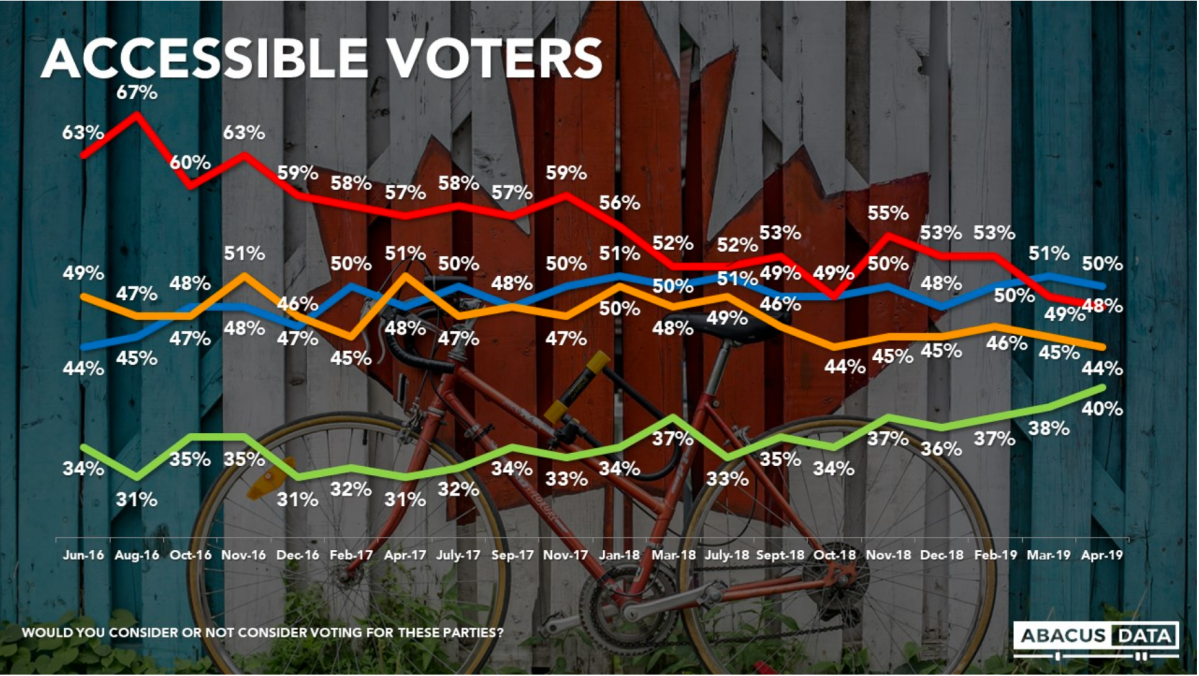Every voter who marks a ballot for a Green candidate for the first time in their lives has their own motivations.

Sure, it could be concern for climate change, a desire for a new approach to building a sustainable society. But it also seems clear that sharp anger at Prime Minister Justin Trudeau’s failed promises to do politics differently combined with little interest in other available progressive options is pushing the Green surge.
For those voters, the first betrayal was the lie of electoral reform. Justin Trudeau had been unequivocal in 2015 that the 42nd general election would be the last first-past-the-post affair. But then less than two years later, he shrugged and gave up on that commitment when he didn’t like the options that Parliament, taking guidance from voters, had offered him. Conservative-minded voters may have been steamed about Trudeau’s broken promises on deficits and fiscal stewardship but the anger from progressives over the failed electoral reform promise was something else.
Then, more recently, it was the seeming grubbiness of old-style backroom politics that emerged in the reporting on the departure from cabinet of Jody Wilson-Raybould and Jane Philpott in the wake of the SNC-Lavalin matter. Trudeau, to many progressive voters, was not only not as virtuous as they’d once believed, he was downright duplicitous.
WATCH: Sarah MacDonald has a one-on-one interview with MP-elect Paul Manly of the Green Party in the riding of Nanaimo-Ladysmith.

In other years, with other leaders, the NDP would be in the best position to harness a progressive voter’s disgust with the Liberals. But not, it seems this year, not with leader Jagmeet Singh.
Instead, many of those voters are, for the first time, going Green.
That surely is the clearest read of Monday’s by-election results in the Vancouver Island riding of Nanaimo-Ladysmith, a riding that is a traditional NDP stronghold but where New Democrats finished third behind the second-place Conservatives and the winning Green Party candidate Paul Manly.
But that win for the Greens was not a flash-in-the-pan but more an exclamation point on a trend we’ve seen unfold for most of the last year, that trend being progressive voters who have discovered options other than falling for a lefty-Liberal leader or beating a path left to NDP orange. These voters have given themselves permission to vote Green and this trend seems set to continue into the fall.

Get daily National news
WATCH: Prime Minister Justin Trudeau reacts to the Green Party’s byelection win in B.C.

Last spring, in the reliably Liberal riding of Guelph, the Greens had a breakthrough in the Ontario general election where they capitalized on Liberal ennui with Kathleen Wynne and got their leader, Mike Schreiner, a seat at Queen’s Park. Liberals in Guelph may still be restless and looking at alternatives. The federal Green Party recently held its nomination meeting and nearly 1,000 attended to choose from among five quality candidates.
In the New Brunswick provincial election last fall, the Greens added to their seat in downtown Fredericton, normally a Liberal neighbourhood, and won in two more ridings, both along the Acadian coast where the local MP is Liberal Dominic Leblanc and where Liberals federally and provincially tend to rule the roost.
And, of course, the just concluded P.E.I. election is yet more clear evidence that Liberal-minded voters now have a new choice when they are disillusioned or unhappy with the red team. The Green Party’s ascension to the status of official opposition is directly the result of the fall to third place of that province’s Liberal Party.
And now there is some data to match those anecdotal trends. Abacus Data released a poll Tuesday which, among other things, tracks what the pollster calls “accessible voters,” voters whose first choice right now might be another party but who would consider voting for the Greens. Growing the pool of those accessible voters is a key first step towards the kind of results that occurred in Nanaimo-Ladysmith, P.E.I., Guelph or New Brunswick’s Acadian shore.
In July, Abacus found that the pool of accessible voters for the Greens stood at just 33 per cent, easily the lowest among the four national parties. But since then, that number has grown steadily, spiking in the wake of the SNC-Lavalin revelations of earlier this year and now sits at what, so far as Abacus’ measurements are concerned, is an all-time high of 40 per cent, just four points back of the NDP (whose pool of accessible voters is shrinking).
WATCH: The P.E.I. Greens didn’t win the provincial election, but they made shockwaves in Canadian politics

If the Greens do push on and actually start stealing votes, where would those votes come from? Abacus says mostly from the NDP. Nearly one in three of those who say they would vote NDP pick the Greens as their second option. But Trudeau’s Liberals could spring a significant Green leak as well, with nearly one in four of those who say they would vote Liberal picking the Greens as option two.
Perhaps more ominously for the Liberals, the Liberal vote right now seems shakiest and most likely to leak. Again to Abacus: just 54 per cent of those who voted for Trudeau in 2015 are prepared to do so again.
By contrast, a rock-solid 83 per cent of those who voted Conservative in 2015 are sticking with the Tories and a decent 62 per cent of 2015 New Democrat voters would stay with Jagmeet Singh’s NDP.
These datapoints are at the heart of the latest suite of Conservative “attack” ads, each of which features an actor pretending to be a voter who cast a ballot for the Trudeau Liberals in 2015 but now feels that commitments then were not honoured. The closing tagline for each of the television spots is “Justin Trudeau. Not As Advertised.”
WATCH: Ontario Green Party leader Mike Schreiner marks his historic in 2018

Trudeau and the Liberals have precious little time until the general election to convince those disillusioned voters, particularly bitter and angry progressive voters, that he can be trusted with their ballot again.
———-
Abacus’ poll results were obtained April 23-30 via an online survey of 4,015 people. As the survey respondents were drawn from an opt-in panel and were not selected randomly, a margin of error cannot be calculated. The pollster weighted the data to reflect Canada’s geographic and demographic makeup.
David Akin is the chief political correspondent for Global News.
- TD Bank moves to seize home of Russian-Canadian jailed for smuggling tech to Kremlin
- ‘Alarming trend’ of more international students claiming asylum: minister
- NBC, CBS polls show Harris gaining ground as election focus shifts to Trump
- After controversial directive, Quebec now says anglophones have right to English health services









Comments